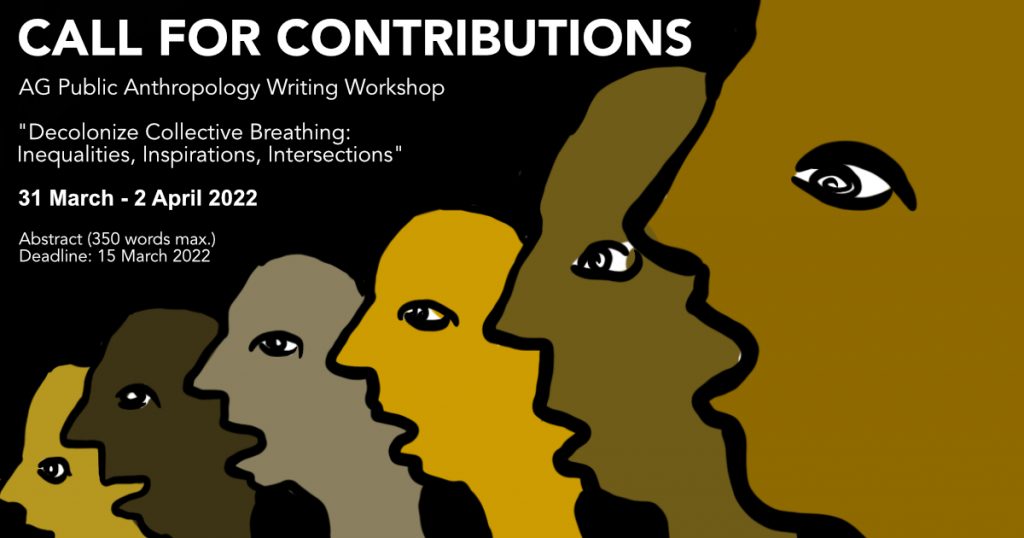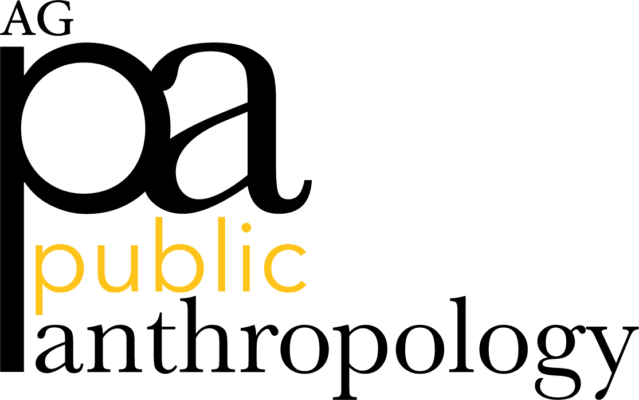
Join the AG Public Anthropology ONLINE writing workshop “Decolonize Collective Breathing: Inequalities, Inspirations, Intersections” (31.3.2022 – 2.4.2022) for an edited volume proposed by NasimaSelim & Judith Albrecht. Send your abstract (350 words) on/before 15 March 2022.
Decolonize Collective Breathing: Inequalities, Inspirations, Intersections
An edited volume proposed by Nasima Selim & Judith Albrecht
Call for Contributions
Breathing is a powerful biosocial metaphor for our current global condition. How we breathe is shaped and influenced by living and working conditions, climate crisis and environmental degradation, and affective, psychological states. We hardly discuss the existential process of collective breath publicly or acknowledge that although everybody breathes, we all breathe differently (Choy 2020; Górska 2016). Toxic air is breathed by the urban poor more than others (Harper 2004). Besides climate change, air pollution remains a major environmental threat to (more-than-)human health, the exposures to and effects of which are unequally distributed across the globe (WHO 2021, Cushing et al. 2015), reproducing patterns of inequalities with the “breathing-in and impact in vulnerable bodies” in urban spaces (Walker, Booker, and Young 2020, 1). In terms of global social justice, the end of a particular era of colonialism has not brought an end to coloniality (Mignolo 2021, Ndlovu-Gatsheni 2013). Coloniality persists worldwide as thoroughly entangled and violent (neo- and post-) colonial structures of inequality that make it impossible to breathe (Fanon 1986). Breathing is also deeply politicized in the current public call for racial justice (Thompson 2020; Dillon and Sze 2018). In pandemic times, Fanon’s anti-colonial argument and the movements for racial justice remind us how systemic oppression intersects global public health (Kundnani 2020).
Biosocial breathing thus becomes a “matter of moving relations” (Solomon 2021, 106) across care, sociopolitical, and ecocritical public arenas. How do we decolonize these relations so that collective breathing becomes equitable? How do we articulate decoloniality by being mindful and engaged with the inequalities, inspirations, and intersections of theories and practices of collective breathing? Mbembe (2021) invites us to think and agitate along with the framing of a universal right to breathe. The Racial Capitalocene (RC)(Vergès 2017) argues for shifting the focus away from universal human responsibility to examine the intersections of race, gender, capitalism, and (neo)colonialism in the climate crisis and environmental degradation (that make collective breathing inequal). As a critique of the popular trope of Anthropocene, these decolonial moves in theory and practice open up epistemic and political spaces for marginalized publics and silenced scholars across the globe to join in their efforts to decolonize collective breathing.
As preparation for our proposed edited volume, the AG Public Anthropology invites anthropologists, artists, and activists interested to take part in a writing workshop (online, 31 March – 2 April 2022) aimed towards real-time writing and peer feedback. We hope you will join our efforts to decolonize collective breathing in conversation with the Universal Right to Breath (Mbembe) and Racial Capitalocene (Vergès)framing to rethink the public role of anthropology intersectionally (Crenshaw 1991), furthering a postcolonial critique of our discipline (Conrad and Randeria 2013), resisting the politics of silencing that separates the “academic” from the “political” (Nader 2019, 82).
If you are interested to contribute to the proposed edited volume, please submit an extended abstract (350 words, of a text and/or audiovisual work, based on your new work or your previous contribution to the 2021 DGSKA Panel) and a bio note (50 words) to nasimaselim@gmail.com; judithalbrecht@hotmail.com on or before 15 March 2022. If you already have written a draft paper, feel free to send it as well.
